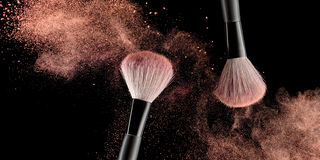The possible side effects of using make-up on the eyes

Cosmetics is a multi-billion-dollar industry, and for a good reason: Who doesn’t love to look their best? Make-up is a wonderful way to enhance your features and stand out from the crowd.
This is more so if you are trying to highlight your eyes, in which case there are range of items you can apply to your lids, brows and lashes including mascara, primer, eye shadow and pencil.
Most people are not aware of the risks to their eyes when applying this make-up, but did you know that some of these products can damage your eyes?
Here are some of the most common eye make-up side effects:
Dryness and irritation
Many eye make-up products, including mascara and eyeliner, contain ingredients that can dry out the delicate skin around your eyes, leading to irritation and redness. Contact lenses can also cause dryness and irritation.
Allergic reactions
You may be more prone to allergic reactions to cosmetics if you have sensitive skin. Symptoms of an allergic reaction include redness, itching, swelling, and watering eyes.
To avoid this, always test new products on a small patch of skin before using them on your face, and discontinue use if you experience any adverse reactions.
Eye infections
Most beauty products are safe for use. However, how you handle and store them can put you at risk for infection. For example, if you share make-up with others, you are more likely to develop an eye infection.
Bacteria can quickly transfer from your hands and make-up brushes to your eyes when applying make-up, which can lead to infections such as pink eye.
What to do in case of a make-up side effect
Symptoms of eye infections include redness, discharge, and crusting around the eyelashes.
If you experience any side effects from using make-up, there are a few things you can do to help ease the symptoms:
- Use artificial tears: If your eyes feel dry or irritated, using artificial tears can help to lubricate and soothe them.
- Flush your eyes with water: If you think you may have come into contact with an irritant, flush your eyes with cool water for several minutes.
- Remove your make-up: If you experience any irritation, redness, or swelling, remove your make-up immediately and discontinue use.
- See a doctor: If symptoms persist, or you experience vision changes, severe pain, or discharge from your eyes, see a doctor as soon as possible.
Common mistakes that cause make-up side effects
Now that you know some of the possible side effects of wearing make-up let's look at some common mistakes that can cause them.
One of the most common ones is not removing your make-up before bed. Sleeping in your make-up can lead to all sorts of problems, including acne and eye infections. Take the time to remove your make-up thoroughly before going to bed to avoid this.
Another common mistake is not thoroughly cleaning your make-up brushes and applicators. Just like your skin, your make-up brushes need to be cleaned regularly to prevent bacteria and other irritants.
Ideally, you should clean your brushes once a week.
Finally, many people do not realise that expired make-up can actually cause infections and other problems. Make-up has a shelf life and using products past their expiration date can lead to all sorts of issues, including pink eye and styes.
To avoid these problems, always check the expiration date on your make-up and discard any products that are past their due date.
How to remove eye make-up safely
- The first step is to always wash your hands thoroughly before beginning the process. Next, use a cotton ball or pad soaked in a gentle eye make-up remover to remove any products from your eyelids and lashes. Be sure to use a different cotton ball or pad for each eye to avoid cross-contamination.
- Once your eyelids and lashes are free of make-up, soak a clean washcloth in warm water and gently press it over your eyes to remove any remaining residue. Next, rinse your face with cool water and pat dry.
- If you wear waterproof mascara or other waterproof products, you may need to use an oil-based make-up remover to break down the product before washing it off.
Conclusion
With proper care and attention, you can avoid the risks of wearing make-up and keep your eyes healthy and beautiful.
If you have any questions or concerns about the safety of your make-up, be sure to talk to a healthcare professional. They will advise you on the best products and practices to keep your eyes healthy.




